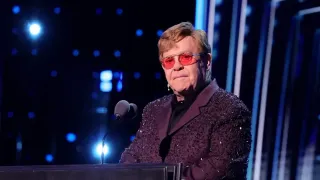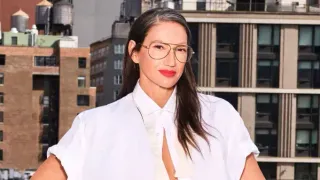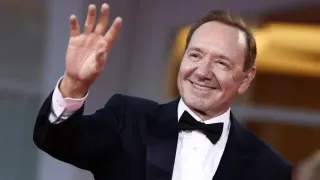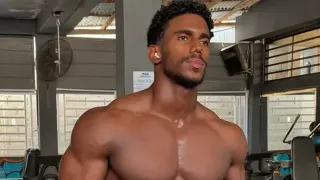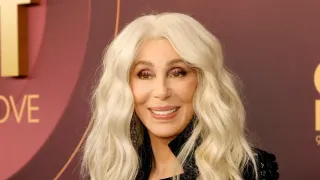
6 hours ago
James Barr Presses Pause: Why “A Gay and A NonGay” Leaves the Mic and Leans Into the Fight
READ TIME: 4 MIN.
When “A Gay and A NonGay” first dropped in 2015, the podcast world was still in its awkward, earnest adolescence. Two men—one gay, one not—sat across from each other, mics hot, ready to poke, prod, and playfully interrogate everything that divided and connected their worlds. As James Barr recalls in a feature published in Attitude, “We had no idea what we were doing and nothing in common, so I suggested a title: A Gay and A NonGay. It was genuinely just two men with a microphone , but suddenly, our conversations were radical. ”
The show took what could have been a simple odd-couple chat and made it into something revolutionary for LGBTQ+ media. Barr and co-host Dan Hudson didn’t just swap stories—they held up a mirror to the ways queerness and straightness are performed, policed, and misunderstood, all while making each other laugh out loud. They were playful, but never trivial: “We’d discuss douching and the prep involved: ‘Straight men don’t have to do any admin; they just need a pint and a vagina, ’ I’d tell my co-host Dan, whose nickname instantly became ‘NonGay’ . ”
Listeners quickly realized this was about more than banter; it was about building bridges, challenging assumptions, and—crucially—othering straightness for once, flipping the script on who gets to be “the norm. ” The podcast’s radical empathy and humor led to a slew of award nominations, a Webby win, and a global fanbase that found comfort, courage, and community in every episode.
Beyond accolades and downloads, “A Gay and A NonGay” left a mark on real lives. Barr shares stories of listeners who discovered the podcast at school and found the courage to come out, or even found love through shared headphones. One message from a mother who listened with her gay son in the car still resonates: “She emailed to tell us that they’d listened together in the car and thanked us for opening up difficult conversations between them. Moments like this always felt like our podcast’s purpose. ”
The show became a kind of queer lifeline, an invitation for LGBTQ+ people and their allies to feel less alone in a world that often felt indifferent or hostile. Barr and Hudson’s chemistry and commitment turned a simple podcast into a cultural touchstone—one that didn’t just reflect the community, but shaped it.
But time, as Barr points out, changes everything. What was once a radical act—queer and straight voices sharing the same space—now feels, to Barr, almost quaint in a world where “the stakes feel so much higher. ” He writes, “Donald Trump Jr is calling trans people ‘more dangerous than Al-Qaeda, ’ companies are killing DEI while pulling hosts off the air for speaking up, and lawmakers are legislating against our existence. In that context, a bit of banter about our differences feels too small. ”
The cultural winds have shifted. Queer visibility is no longer enough; survival, activism, and fierce solidarity are the order of the day. Barr’s decision to pause the podcast isn’t a retreat—it’s a pivot to the frontlines. He’s choosing to channel his energy into fighting structural hate, uplifting trans and non-binary voices, and addressing the trauma and healing needed within the community. “Survival changes you. It changes what you give your energy to. I don’t want to explain myself to straight people anymore—I want to fight. For queer survival, for trans lives, for safety. ”
This moment isn’t just about the end of a podcast; it’s about a broader shift in queer cultural priorities. Barr’s journey mirrors a growing sentiment in LGBTQ+ circles: the work of explaining, educating, and inviting allies in is vital, but so too is turning inward—healing, celebrating, and protecting our own. Barr is candid about his personal evolution, sharing that surviving an abusive relationship has reframed his sense of purpose. “Working through that pain has shown me how much healing our own community still needs from within, how deeply our trauma shapes the way we treat each other. That’s where I want to put my energy now—using my comedy to say the hard stuff out loud, so that none of us feel alone. ”
He’s not burning bridges—on the contrary, Barr pays tribute to the friendship and allyship of Dan Hudson, whose “incredulous commitment to banning so-called ‘conversion therapy’, uplifting trans lives and working tirelessly to bring attention to our podcast time and time again has taught me the meaning of allyship. ”
As “A Gay and A NonGay” takes a well-earned pause, its legacy is clear: it showed us that difference can be a source of laughter, learning, and love, but that fighting for our future sometimes means going beyond the conversation and into the fray.
Barr’s next act promises to be bolder, braver, and even more necessary. The queer community, he reminds us, deserves nothing less.
